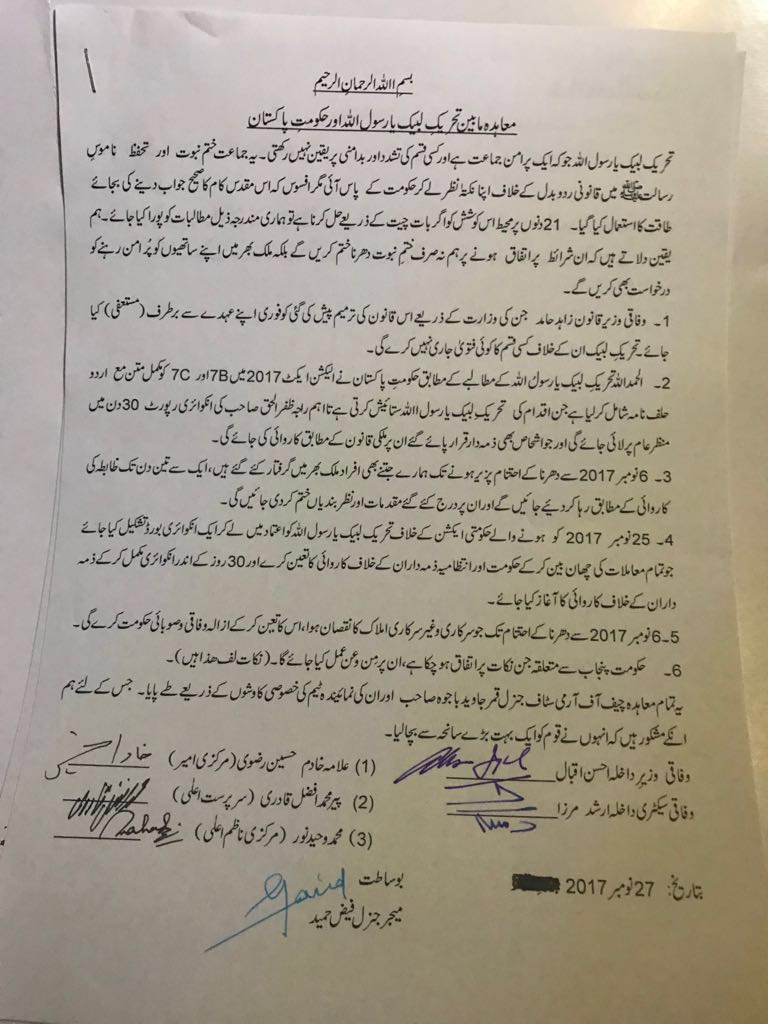ISLAMABAD, Pakistan: Finally the 21-day long sit-in at Faizabad in Islamabad reached its culmination on Monday after the Law Minister Zahid Hamid tendered his resignation as a result of an agreement reached between Tehreek Labbaik Ya Rasool Allah (TLYR) and the federal government last night.
The announcement mentioning the end of the sit-in in the Federal Capital was made by the TLYR leader Maulana Khadim Hussain Rizvi in a Press Conference in Islamabad a little while ago.
With the end of Faizabad sit-in, all other protests, which had broken out across the Country in retaliation to Faizabad Operation launched on November 25 to implement Court’s order to clear the Faizabad Interchange from protesters, were also called off.
Khadim Hussain Rizvi also announced to withdraw the shutter down strike call, the traders had earlier announced to observe throughout the Country. He said that all protests across the Country would be ended by evening.
The Chief of Army Staff (COAS) General Qamar Javed Bajwa played a pivotal role in breaking the standoff between the federal government and the protesters as both the conflicting sides had earlier held a series of talks to remove each other’s concerns but all efforts proved inconclusive. Eventually the two sides resorted to use of force against each other on November 25, resulting in multiple casualties.
In a meeting with Prime Minister Shahid Khaqan Abbasi in Islamabad on Sunday, the COAS asked him to avoid violence and opt a negotiation process to end the deadlock.
Later the federal government and the protesting religious parties inked a six-point agreement under which it was agreed that the Law Minister Zahid Hamid would resign while the Tehreek Labbaik Ya Rasool Allah would not issue any Fatwa (religious decree) against him following his resignation.
It was agreed that the report of Senator Raja Zafarul Haq-led Inquiry Committee would be made public within 30 days, and all those, who had been found responsible in amending the Khatm-i-Nabuwwat Clauses in Election act, would be dealt as per law.
In addition, it was agreed that the government would release all protesters who had been detained as a result of November 25 Crackdown, and the all Cases registered against Tehreek Labbaik Ya Rasool Allah leaders and activists would be ended.
It was also agreed that an Inquiry Board would be formed which would conduct a 30-day investigation into the November 25 Crackdown and determine that who was responsible for such initiative. Eventually, action would be taken against responsible people accordingly.
Likewise, the federal and province governments would compensate for the loss of all government and private properties incurred during the 21-day long sit-in – from November 6 to November 27. While all the agreements reached with the Punjab government would be implemented with letter and spirit.
Meanwhile, the Interior Minister Ahsan Iqbal appeared before the Islamabad High Court (IHC) judge Justice Shaukat Aziz Siddiqui on Monday morning during a hearing of the Faizabad sit-in Case.
Justice Siddiqui expressed his displeasure over the conduct of the federal government with regard to handling the Faizabad sit-in.
The Chief Commissioner Zulfiqar Ahmed Bhutta told the IHC that an agreement had been reached with the protesters and the Court’s orders would be implemented. Upon that, Justice Siddiqui remarked that the Court had ordered for vacating the Faizabad Interchange, not for any agreement.
During the Course of hearing, Justice Siddiqui also raised questions over the role of Pakistan army in ending the Faizabad sit-in, and asked that according to which law, a Major General of Pakistan army played a mediating role between the government and the protesters.
Justice Siddiqui observed that how was to make an army officer a mediator as per the Constitution of Pakistan. He asked that didn’t the Constitution apply to the COAS?, reported Express News.
The IHC judge also asked that who stabbed in back of police, and how did the protesters got hold of tear gas gun and masks?
Justice Siddiqui also asked the Intelligence Bureau (IB) to check one audio conversation of an alleged army official with someone about dharna (sit-in) and police action. He observed that whosoever was interested in politics while sitting in army should have left army and joined politics.





